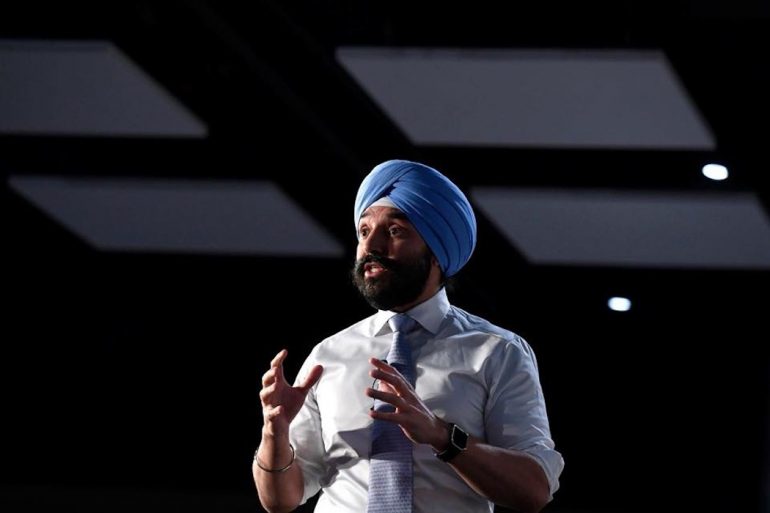A recent report from the parliamentary budget officer (PBO) and a letter from tech CEOs to the prime minister of Canada have painted a-less-than-impressive picture of the federal government’s performance on some of its innovation programming.
“The opportunities are immense, but we’re going to continue to listen and work with companies and with Canadians.”
– Navdeep Bains
Today, in an interview with BetaKit, Minister of Innovation Navdeep Bains pushed back, saying he’s proud of the investments the federal government has made in fostering innovation in Canada.
The remarks followed a virtual showcase held on Wednesday touting the progress of its Innovation Superclusters Initiative. The event heard from the leaders of each Supercluster and highlighted projects that have received support.
The Innovation Superclusters Initiative was launched in 2018 with $950 million in funding over five years to promote large-scale collaboration among industry leaders, small to medium-sized businesses, and post-secondary institutions, to develop and scale high-potential technologies in Canada.
There are five Superclusters as part of the initiative: the Atlantic Canada Ocean Supercluster, the Ontario-based Next Generation Manufacturing (NGen) Supercluster, the Quebec-based Scale AI Supercluster, the Prairies-based Proteins Supercluster, and the British Columbia-based Digital Technology Supercluster.
The showcase followed the report from the PBO, which found the federal government’s Innovation Superclusters Initiative was far behind its spending goals as of March.
The report specifically found that as of March, the Superclusters were $74 million behind schedule, and had dolled out just $30 million instead of the $104 million they had been projected to spend by that time.
RELATED: Supercluster funding $74 million behind schedule, according to new PBO report
However, at Wednesday’s event, Bains, minister of innovation, science and industry, expressed his satisfaction with the program. Speaking with BetaKit afterwards, the minister stressed that the PBO report’s data was only relevant up to March 2020.
“If you take into account March, and now year to date, we’ve seen enormous progress,” said Minister Bains.
He noted that of the over 220 innovative projects that have been approved, 56 percent of the Superclusters’ projects are connected with small and medium-sized businesses across the country. The minister added that the Superclusters Initiative has announced over $800 million in investments – the majority of which ($420 million) was invested by industry.
At the Supercluster showcase, the federal government also highlighted some key milestones for each of the Superclusters since March.
According to CEO of Scale AI Julien Billot, the Montreal Supercluster has seen $111 million deployed in 20 projects.
The NGen Supercluster has approved investments of $124 million into 60 projects, leveraging more than 200 and $30 billion in new innovation spending, according to CEO of NGen Jayson Myers.
The Digital Technology Supercluster, which recently rounded out its $60 million COVID-19 program, has seen $223 million deployed in 67 projects, according to CEO Sue Paish.
The Ocean Supercluster also reports it has approved $180 million in projects involving more than 90 Canadian companies. And, the Proteins Supercluster has seen $272 million deployed and has secured 230 members.
“If you take into account March, and now year to date, we’ve seen enormous progress.”
The recent PBO report argued that based on its data there is a strong unlikelihood the government will meet its objective of the Supercluster initiative, which is increasing GDP by $50 billion over 10 years through the Superclusters Initiative. Minister Bains stressed that the initiative represents a longer-term play for Canada’s innovation economy.
“These initiatives are designed to not only succeed in the short term, but we’ll really see the potential and the upside in the coming years,” Bains added.
While Bains argued that the government is making progress with such innovation programming, the remarks come in the wake of recent criticism from a group of Canadian tech CEOs. In an open letter to Prime Minister Justin Trudeau this week prominent tech CEOs, including Lightspeed’s Dax Dasilva, Borrowell’s Andrew Graham, and Coveo’s Louis Têtu, urged for a stronger national innovation strategy.
“We see less of a bold, cohesive plan for innovation in Canada and more of a patchwork — pilot programs and furtive policies rolled out in hope they will amount to something greater than the sum of the parts,” the letter read.
Regarding the recent letter, Bains told BetaKit the government is “very much committed” to innovation, productivity, and competitiveness for Canadian businesses. He argued that Canada has “turned the corner” through its Innovation and Skills Plan.
“We’re very proud of the fact that we’re investing in talent and people and skills. We’re very excited about the capital that’s coming to Canada and the record venture capital financing that’s taking place here in Canada,” Bains said.
The minister also highlighted the government’s Global Skills Strategy as a key initiative undertaken by the federal government to improve Canada’s innovation economy. He also noted 2019’s record venture capital financing (which reached $6.9 billion), and the now 42 companies set to become unicorns, which, he added, is “well above” the seven in 2015.
“That level of scale across the economy, again, speaks to the opportunities for [companies] to not only succeed within Canada, but also take advantage of our trade agreements and succeed internationally as well,” Minister Bains added.
Although yesterday’s letter did not include specific policies, it highlighted several initiatives that the CEOs feel need more progress. Some of these included the rollout of a strategy on intellectual property and the implementation of the recommendations from the Economic Strategy Tables.
“We’re very excited about the fact that we launched our first national intellectual property strategy, we’re going to move forward to update our privacy laws to make sure that we protect individual privacy so that we focus on responsible innovation around data and AI,” Bains said.
“The opportunities are immense, but we’re going to continue to listen and work with companies and with Canadians and engage with them because that’s what we believe in.”


